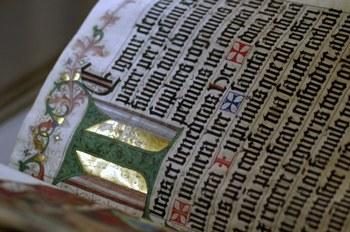
The EPM – EQUIPE PROPHECIES DE MERLIN – attend to the tradition, the historical-literary profile, the sources and the reception of the Medieval French Prose Romance Prophecies de Merlin and more generally to the medieval prophetic tradition of Merlin. Composed in Northern Italy in the 13th century, Prophecies de Merlin is a dialogical prose romance that blends Merlin's fictional prophecies with episodes of the Arthurian subject. The work is characterised by the hybridity of its form, halfway between a collection of political-doctrinal predictions and a prose romance, of which it is therefore a unique and original example. Although the story is linked to the events and characters of the Lancelot-Grail, Guiron le Courtois and Tristan en prose, the Prophecies shed light on episodes not explored in other Arthurian romances, focusing on the figure of Merlin, protector of Arthur and his kingdom, of the Round Table and his knights, but above all omniscient prophet, capable of predicting future times up to Judgement.
The EPM, starting from an analysis of the tradition, forms, style, language, sources and fortune of the Prophecies de Merlin, intends to study the ways in which Merlin's prophecies are inserted into the construction of Arthurian novels, to explore their narrative and stylistic mechanisms. The EPM also intends to study the romances prophecies within the broader panorama of the prophetic traditions that flourished during the 13th and 14th centuries in Europe.
The EPM met as research team in 2017 at the Department of Classical Philology and Italian Studies of the Alma Mater Studiorum – University of Bologna with the participation of the Department of Philology, Literature and Linguistics of the University of Pisa, the Department of Humanities, Social Sciences and Cultural Industries of the University of Parma, the Romanisches Seminar of the Universität Zürich, joined in 2019 by the Department of European, American and Intercultural Studies of the Sapienza – University of Rome and the Centre de recherche Ecritures of the Université de Lorraine.
L'EPM – EQUIPE PROPHECIES DE MERLIN – s'occupe de la tradition, du profil historique-littéraire, des sources et de la réception du roman français médiéval en prose Prophecies de Merlin et plus généralement à la tradition prophétique médiévale merlinienne, romanesque et d’autres genres. Composées en Italie du Nord au XIIIe siècle, les Prophecies de Merlin sont un roman dialogique en prose qui mêle les prophéties fictives de Merlin à des épisodes du sujet arthurien : l'œuvre se caractérise par l'hybridité de sa forme, à mi-chemin entre un recueil de prédictions politico-doctrinales et un roman en prose, dont elle constitue donc un exemple unique et original. Bien que l'histoire soit liée aux événements et aux personnages du Lancelot-Graal, Guiron le Courtois et Tristan en prose, les Prophecies éclairent des épisodes non explorés dans d'autres romans arthuriens, en se concentrant sur la figure de Merlin, protecteur d'Arthur et de son royaume, de la Table Ronde et de ses chevaliers, mais surtout prophète omniscient, capable de prévoir les temps futurs jusqu'au Jugement.
L'EPM, à partir de l'analyse de la tradition, des formes, du style, de la langue, des sources et de la fortune des Prophecies de Merlin, se propose d'étudier les modalités d'insertion des prophéties merliniennes dans la construction des romans arthuriens, et d'en explorer les mécanismes narratifs et stylistiques. L'EPM entend également étudier les prédictions contenues dans les romans dans le cadre plus large des traditions prophétiques qui ont fleuri aux XIIIe et XIVe siècles en Europe.
L'EPM s'est réuni en tant que équipe de recherche en 2017 au Dipartimento di Filologia Classica e Italianistica de l'Alma Mater Studiorum – Università di Bologna avec la participation du Dipartimento di Filologia, Letteratura e Linguistica de l'Università di Pisa, le Dipartimento di Discipline Umanistiche, Sociali e delle Imprese Culturali de l'Università di Parma, le Romanisches Seminar de l'Universität Zürich, rejoint en 2019 par le Dipartimento di Studi europei, americani e inter-culturali de la Sapienza – Università di Roma et le Centre de recherche Ecritures de l'Université de Lorraine.